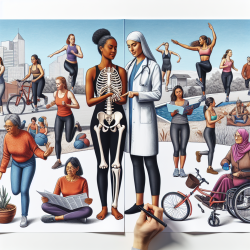Introduction
In the realm of osteoarthritis (OA) care, women, particularly those from racialized groups, often face challenges in accessing equitable and person-centred care. The recent research article, "Identifying strategies that support equitable person-centred osteoarthritis care for diverse women: content analysis of guidelines," sheds light on these disparities and offers insights into improving care for disadvantaged groups. This blog explores the findings of this study and discusses how practitioners can enhance their skills to provide better outcomes for women with OA.
Understanding the Research
The study analyzed 36 OA guidelines published between 2003 and 2021, focusing on the inclusion of person-centred care (PCC) and equity considerations. Despite the prevalence of OA among women and the known barriers they face, the study found that current guidelines often lack comprehensive guidance on how to implement PCC effectively. Notably, only 39% of the guidelines included patients in their development panels, and few addressed the specific needs of disadvantaged groups.
Key Findings
- Most guidelines mentioned enabling self-management and shared decision-making, but few provided detailed guidance on how to achieve these goals.
- Domains such as exchanging information, responding to emotions, and managing uncertainty were rarely addressed.
- Only 8% of guidelines recognized socioeconomic status as a barrier to OA care, and a mere 6% offered strategies to improve equitable access.
Implications for Practitioners
Practitioners can play a crucial role in bridging the gap between guidelines and patient care. Here are some actionable steps based on the study's findings:
- Engage in Continuing Education: Stay informed about the latest PCC frameworks and tools that address the unique needs of diverse women with OA.
- Foster a Healing Relationship: Establish a non-judgmental, respectful rapport with patients, showing genuine interest in their concerns beyond clinical issues.
- Utilize Assessment Tools: Employ risk assessment tools to identify patients who may need additional support post-surgery, ensuring a smooth transition to home care.
- Advocate for Patient Involvement: Encourage the inclusion of diverse patient voices in the development of clinical guidelines to ensure they reflect the needs of all patient groups.
Encouraging Further Research
While the study highlights significant gaps in current guidelines, it also opens avenues for future research. Practitioners are encouraged to explore multi-level strategies that can be implemented to enhance equitable, person-centred OA care. This includes patient, clinician, and system-level interventions that can be integrated into clinical practice and guidelines.
Conclusion
The findings from this study underscore the need for more robust and inclusive guidelines that support equitable OA care for women and other disadvantaged groups. By incorporating comprehensive PCC strategies and addressing barriers to care, practitioners can significantly improve outcomes for their patients. For those interested in delving deeper into the research, the original paper provides a wealth of information and can be accessed here: Identifying strategies that support equitable person-centred osteoarthritis care for diverse women: content analysis of guidelines.










